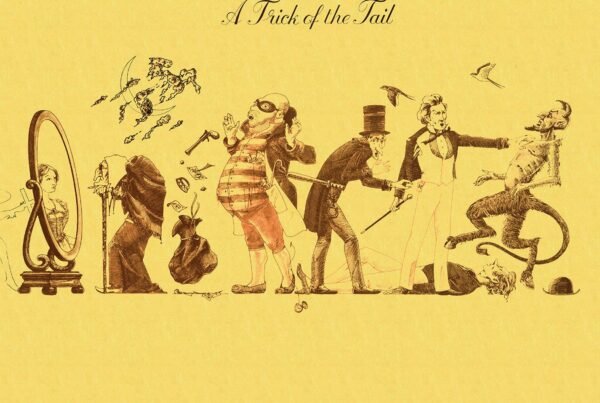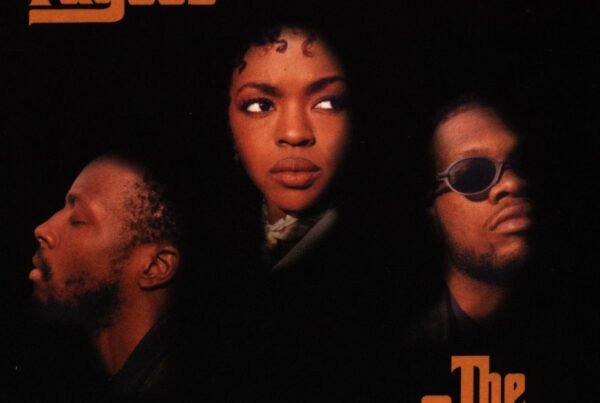‘If Halcyon Digest is, indeed, about finding a place in a world that won’t let you in, then “Desire Lines” is the door in which we can finally find our way through.‘
-Steve Loschi

Release date: September 27, 2010 | 4AD | Facebook | Instagram
Even in the context of the far-reaching sounds of the ’00s indie scene, Deerhunter were always… different. Taking cues from shoegaze, girl groups, and experimental bands like Stereolab, this band has been crafting perplexingly intoxicating music for over two decades at this point. A definitive high point of their discography is 2010’s noise pop delight Halcyon Digest, which spawned some of their most recongizable songs and moments.
Steve Loschi
While Deerhunter’s Halcyon Digest is inarguably a classic addition to 21st century indie rock, the reason I chose to participate in this particular feature is because of one song, which I’ll get to later. This isn’t to take away from any of the other songs. The album is a stellar example of how bands can incorporate a sense of place in their music. The psychedelic twists on Southern folk that Bradford Cox and his bandmates did as Deerhunter are straight from the Spanish moss covered live oaks that dot the Georgia terrain. These are songs that evoke the feeling of swatting no-see-ums from your face as you start a fire at the end of a makeshift trail into the woods. The hot summer sun setting over vast open fields of peanut and soybean, center-pivot irrigation systems casting small rainbows through the open horizon.
And yet, Deerhunter has always been about being on the outside looking in. Music for the Southern outcasts that aren’t waving flags with a thin blue line, or wearing red caps and berating the immigrants for stealing jobs. Deerhunter is about finding your place in a world that did not find the room to let you in. Suffering from Marfan Syndrome meant Bradford Cox navigated a world in which he was constantly misunderstood. His lanky build and sunken cheekbones found him often pegged as a junkie. These misconceptions fueled the music on Halcyon Digest in a way that makes it very easy to identify with.
Deerhunter is all these things, but now it’s time to talk about THAT song.
The best song on the band’s fifth release isn’t the gentle Everly Brothers croon of “Don’t Cry” or the Beck-ish sway of “Revival.” It’s not the Elvis Costello-like pop of “Memory Boy” or the glitchy electronic majesty of album closer “He Would Have Laughed”. All of these are great compositions that stand on their own as pop music gems. No, the best song on the album wasn’t even written by Cox, but by guitarist Lockett Pundt.
That song is “Desire Lines”.
“Desire Lines” isn’t just the best song on a great album. “Desire Lines” is one of the best indie rock songs released this century. That’s high praise, of course, but in terms of songs that are driven by guitars and drenched in melody, Pundt’s contribution to Halcyon Digest is an epic one. Divided into two distinct halves, the first half of the song consists of down-strokes on the guitar with a descending guitar line on top. Once the snare hits and Pundt’s laconic vocals usher in the melody, you find yourself in the middle of a shimmering indie pop classic. From the arpeggiated guitar over Pundt’s ‘wo-oh’s, the song pays tribute to the best of shoegaze-y, late ‘80s, early ‘90s rock and roll.
But it’s at the three minute mark where the song really takes off into the stratosphere of guitar glory. Revolving around a geometric pattern of five chords that circle back on each other, the interplay between Bradford Cox’s and Lockett Pundt’s guitars is a hypnotic journey through the southern muck. The song acts as a ray of light through the slats of an old porch, casting a brief glimpse of hope through the crawlspace where much of Cox’s compositions reside. The deceptive simplicity of “Desire Lines” makes it a song that punctures through the fifteen years that have passed since it was released. I’m constantly amazed at how much it continues to reward on subsequent listens.
If Halcyon Digest is, indeed, about finding a place in a world that won’t let you in, then “Desire Lines” is the door in which we can finally find our way through. The entire album is worthy of celebration because it gives a voice to those who aren’t always recognized, the no-see-ums of Southern society. It’s good to know that within the swirling guitars, the glitchy embellishments and Bradford Cox’s much maligned characterizations, there is space where all of the monsters and maniacs of this world can find a place to share their voices.
Broc Nelson
Looking back at 2010, I am blown away at the number of incredible albums that came out that year. It was a year where I was approaching the end of my peak indie phase, gleefully absorbing the myriad albums recommended by friends and my favorite blogs. So, I have to offer myself some grace for not connecting with Deerhunter’s Halcyon Digest right away. I felt like a fair-weather fan of the band, enjoying Cryptograms and Weird Era Cont. while feeling lukewarm about Microcastle. It wasn’t until the following year when Bradford Cox’s Atlas Sound project released the excellent Parallax that I decided to revisit Halcyon Digest.
Halcyon Digest was a slow burner of a record. I kept returning to it over the course of 2011, started adding songs to playlists, and eventually feeling foolish for not recognizing its greatness from the get go. “Desire Lines” is an earworm that beautifully captures the kind of driving rhythm and hook that was making Arcade Fire a household name while weaving in ‘90s alt guitar melodies like Built To Spill. It is an easy single to love. “Revival” is similarly a sweet little bop, that moves from sunshine folk pop to some of Deerhunter’s more trademark intensity. These songs are great, but it was “Helicopter” that glued everything together for me.
Its bubbling electronics and tender melody are still mesmerizing as a ballad unfolds from the point of view of a victim of human trafficking, making it all the more surreal that such a forward-thinking pop song would be so bleak. I fucking love those kinds of songs. They resonate in a different way, making you dance or tap your feet to some of humanity’s shittiest behaviors so that each beat pulses into your empathies and morbid curiosities until you’re smiling with understanding of the great absurdity of everything.
These songs kept me going back to Halcyon Digest, and with each listen I found a new song to fixate on. The slow build of “Earthquake,” the sax solo on “Coronado,” and the cautionary nostalgia of “Basement Scene” are ceaselessly charming, but it is the closing song, “He Would Have Laughed” that is the ultimate selling point on this record. I don’t think more than three months have gone by in the last 14 years where I didn’t listen to this song. For one thing, it was on a work playlist, but it isn’t a popular bar song. It was on my bartending playlists solely for me. It’s hypnotic acoustic guitar and drums march to the beat of my brain when I am working. Its quirks and cryptic lyrics leave little question marks that get swept up in the beat. Its twist into a sweet campfire strum carried by ambient textures that abruptly cuts off is magical. I can tune into this song with the same enthusiasm at any given point in the song, but listening to its detail in full is breathtaking.
For all of the competition for album of the year lists in 2010, and all of the albums from that year that I adore, Halcyon Digest remains the one I listen to the most, weaving comfort and touches of weirdness together in a perfect amalgamation of classic, alternative, indie, and pop rock.





